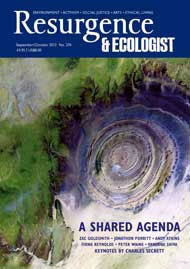Friends of the Earth reached a milestone last year when we turned 40. We can claim huge achievements over the last four decades, from being in the vanguard of those who have made environmental concern a mainstream concern in the UK to leading the campaign for the first climate-change law. The world is a better place for our efforts. Yet a sober assessment of the scientific data and the evidence in our daily lives – from climate change to the loss of our garden birds – says that the environment movement needs to do much more, and do it very differently, to preserve an equable and abundant planet for future generations.
We’ve thought a lot in our anniversary year about what has changed, about the threats and opportunities this poses, and about how we should respond. Here are a few of our conclusions:
A different world. We are heading towards a planetary emergency – what Sir John Beddington, the Chief Scientific Adviser to the UK Government, has called “a perfect storm” of environmental crises. We’re being propelled into it by the powerful interaction of several trends, including climate change, a growing global population, and damaging production and consumption patterns. We are in grave danger of transgressing what the scientists are increasingly recognising as ‘environmental limits’ beyond which we cannot safely go without triggering changes of a scale and seriousness that imperil our collective future. It’s now clear that the next 40 years will be decisive. We act or we run out of future.
To add to the mayhem, the West is now in its deepest economic crisis since the 1930s. Deficit cutting and the search for growth and economic security dominate political and public concerns, and the environment has been pushed down the agenda. But all is not bleak. Despite the downturn, the public is now deeply aware of the reality of climate change and the loss of tropical forests and fish in our oceans. This carries a risk: that in the blink of an eye, in historical terms, the public goes from denial that there is a problem to despair that the problems are so intractable that nothing can be done. But it presents a historic opportunity too – to convert awareness to action.
Concern for the environment has also become more widespread in the ‘non-environmental’ world. Businesses, faith groups, development NGOs and whole communities are shrinking their environmental footprint, and environmental campaigners are no longer voices crying out in the wilderness. Some may see this as a threat; I and my colleagues see it as an opportunity.
And then there’s been a communications revolution. When I was cutting my campaigning teeth in the mid-1980s there was no web or email, no digital camera or laptop, no mobile phone, text, Facebook or Twitter. Today these innovations provide a treasure-trove of channels and styles for campaigners to use to reach the public. Significantly, too, this explosion of social media and mobile technology is rapidly eroding the power and control that media magnates and authoritarian states have over what we read or see.
Renewing and grounding our vision. Some of the most iconic leaders of the last century – Martin Luther King or Nelson Mandela, for example – combined three things: an astute grasp of current reality, a willingness to articulate this fearlessly despite its unpopularity with many, and an ability to cast a vision of the future.
In the same way the environmental movement needs to become relentless at communicating a real-world understanding alongside a vision of the future plus the solutions to get us there. Friends of the Earth’s own vision is for a new positive relationship between people and Nature. It is our understanding that ultimately the wellbeing of people and planet are the same thing. And we want this to be embedded in decision-making at every level of society. The evidence is that greater fairness in sharing the benefits of the environment and the costs of damaging it will be vital to progress and we are now embarking on a two-year programme to identify the key solutions to our most urgent environmental problems. The result will be a refreshed vision, grounded in 21st-century reality, with practical steps to transform that reality to a fair and planned transition to sustainability.
Scaling up. If humans are to divert from our current path of crashing through critical environmental limits, we need change in key areas of human activity, urgently. Friends of the Earth will focus on key environmental limits of climate change, loss of Nature, and resource consumption – which is driving the first two. Our triple goal is to see the UK, by the end of the decade, firmly on the path to being a low-carbon, low-resource-use economy, restoring key ecosystems and species. With our focus on this, our new suite of campaigns is aimed at transforming our energy sector, halting the decline in bee populations and promoting greener products.
Joining up the dots for the public. Friends of the Earth has always provided a way for people to come together to take action on the environment but we understand that the scale of change the environment movement now seeks will require much wider public backing. We must engage the public, which means showing the connection between economy and environment: for example, that rising energy prices are caused by the country being hooked on fossil fuel, while renewable energy prices are falling; or that bees are key free pollinators of our fruit and vegetables, and without them food prices will rise hugely. We must also link to the whole person – with emotions and creativity. And our analysis and proposals must remain scientifically sound.
Teaming up. Lastly, the urgency of bringing change at such a scale means we must move together, as one movement, to harness the unprecedented opportunities presented by so many other organisations now ‘getting’ the environment. That is why Friends of the Earth is exploring new alliances to deliver change together that we would struggle to achieve alone. Our Clean British Energy campaign, for example, sees us in formal collaboration with two green energy companies.
The environmental movement in this country, of which Friends of the Earth has been an integral part since our launch, has much to be proud of. But the reality of impending planetary emergency means that to reach our collective vision we need to engage many more people to support sustainability and deliver transformative change fast.
This is the challenge we have set ourselves for the next decade. And if you haven’t already joined us in it, then please do so!
Satish Kumar is one of the key speakers at the 2012 Friends of the Earth conference, which takes place in London from 14 to 16 September. For more details visit www.foe.co.uk







